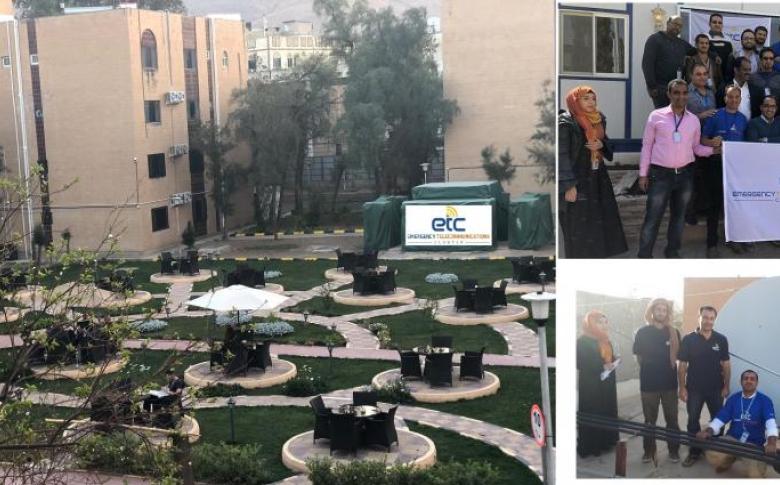Work, Uninterrupted

Just a few years ago, thoughts of Yemen might have conjured up fairytale images of Sana’a’s famed Old City with its baked brick towers and qamariya windows or the perfumed frankincense trees that cemented its place on the ancient Arabian trade routes.
Today, those images have faded. The now three year-long civil conflict has torn apart Yemen - already the poorest country in the Middle East – resulting in one of the worst manmade humanitarian crises of our time. Starvation is rife and to compound the already dire situation, the worst cholera outbreak in modern history has ravaged the country, leaving one million Yemenis infected.
The Emergency Telecommunications Cluster (ETC) was activated in Yemen in 2015, providing vital communications services to humanitarians and adapting its activities to urgently meet the evolving needs of responders on the ground.
For its part, the World Health Organisation (WHO) is leading the overall response to the cholera epidemic and is establishing 26 Emergency Operations Centres (EOCs), hubs where humanitarians can meet and coordinate response efforts. For WHO’s work in Yemen, the need to communicate quickly and reliably can mean the difference between saving lives and losing them. The ETC and WFP Yemen IT teams have played an integral role on the ground helping to procure, install and maintain the necessary IT equipment to ensure Internet connectivity is reliable and solar power supply and video/audio conferencing facilities are available day and night.
Jennie Musto, WHO incident manager for the cholera and diphtheria outbreaks, says that she relies on ETC Internet connectivity services in the EOC in Sana’a and outside the compound. She explains that each cholera treatment facility in the field uses a line list – a document that includes medical information on each sick individual - to help keep track of an outbreak and report to higher government levels and the EOC.
“WFP and ETC services are essential to our work as they provide daily support and allow us to conduct video conferences with hubs in the field. In a context like Yemen, it is not always smooth sailing but ETC services are invaluable to us,” says Jennie.
ETC services in the UN compound (UNCAF) in Sana’a are just as useful for the everyday needs of responders as Vakhtang Svanidze, Deputy Country Director for UNDP Yemen, explains: “The local connection is not good in terms of quality so we fully rely on the ETC Internet connectivity – it is reliable and the primary connection for all communication taking place in the compound.
“Some days, especially when violence is at a high, we are stuck in the compound and work late hours as our HQs are in different time zones...the ETC [connectivity] is a critical, critical service. Basically, it is a lifeline and enables us to work and connect with people all over the world, uninterrupted,” says Vakhtang.
Similarly, Samy Guessabi, Area Coordinator with the Agency for Technical Cooperation and Development (ACTED) uses ETC services in Ibb: “We use the ETC’s satellite connection which is pretty helpful as the Ibb hub is really important to ACTED. We hold a lot of meetings there for partners and international non-governmental organisations (INGOs). We also have our own connection in Ibb but the ETC one is more useful as we can share it with partners. It is so good that we want the ETC to extend its services in other places, like Aden, so let’s see.”
Wali Noor, ETC Coordinator in Yemen, is proud of what the team has achieved, working to tackle challenges like connectivity access, reliability and stability as well as grappling with a limited local market for IT equipment. “The ETC team conducted a comprehensive assessment of the ETC services provided to identify quick wins and ways we can improve. We made some changes so we had lots of smiling faces…now they [responders] are doing online meetings over Skype and chatting with their loved ones on social media,” he explains.
The provision of these services to humanitarians working under such difficult circumstances has translated into a certain level of trust in the ETC’s work. Wali admits that the ETC is now receiving a lot of requests to provide additional services in new locations, enabling humanitarians to reach more people in need - a small ray of hope amidst uncertain times in Yemen.